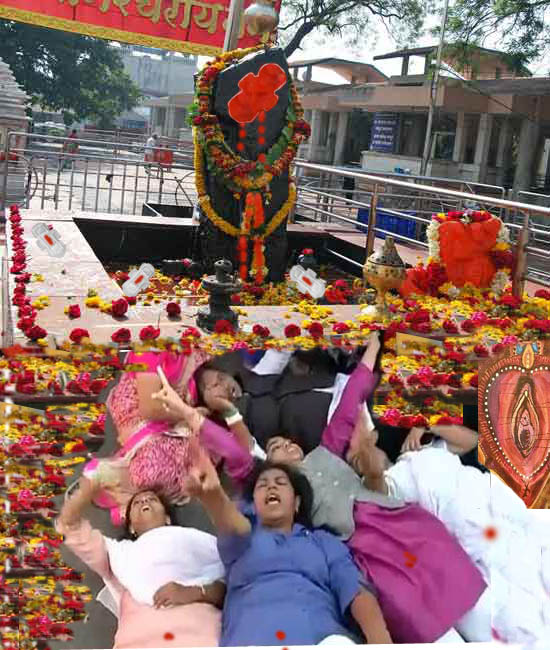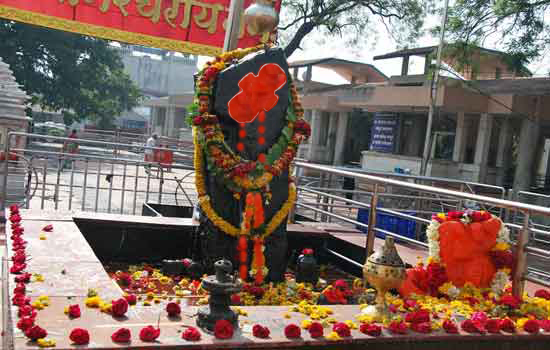The only way that you can “un sexist” the tradition is to demand that men should also start menstruating.
Anyone with any basic exposure to our dharma would feel ashamed at being unsanitary in a temple environment. It is quite normal to not shower the object of your devotion with your blood, sweat, urine, fecal matter, etc. When one is not functioning at 100% capacity, one shouldn’t be exerting oneself by going to a temple.
You can pray always in the mandir of your heart no matter what; but physical prayer, demands physical purity. It is the same reason that muslims wash their hands and feet constantly, or that we take bath daily.
No one goes to the puja room without first cleaning themselves up internally and externally. Basic guidelines for saucha asaucha are detailed in the practice of Yoga.
To go to a temple physical cleanliness must be observed in all respects; the purpose of going to the temple is to attain mental cleanliness. The idols are black for a reason – to absorb all your negative energies (doshas).
When a woman menstruates, this intiates the yogic process of dosha cleansing, which is automatic in women; which is why women are considered closer to the state of Devi (hence, why they are also not required to follow any vedic rituals except those that are required to support their husbands in the execution of their dharma). Men on the other hand are not naturally clean, since they do not have this internal nature-regulated cleansing. This is why men were the original practioners of Hatha Yoga, etc. because they had to artificially simulate what women do by their natural processes in order to cleanse the doshas that accumulate in them. Women were never the practioners of physical yoga practices because it was not necessary – nature took care of it automatically on a periodic basis. Women are considered close to the state of Devi because their natural hormonal cycles are in harmony with the cycles of nature (prakrithi). Women in this state are not allowed to touch anything because they become living magnets for doshas in their state. Nature can absorb those doshas, but women being finite individuals, cannot. A temple environment is one in which your doshas are directed to flow towards the deity – one of the reasons why temple idols are constantly undergoing “abhishekam” is to cleanse the black stone and return those doshas to nature which can absorb them. If a menstruating woman is present, everyone’s doshas will attach to her, as she is a living embodiment of that purity of the Goddess. Nature abhors a vacuum, as they say, and doshas will flow towards a void where there is an absence of doshas, to balance out the energy. This is the symbolism of Kali – she is black because she represents the great void (sink) and she is associated with blood because she absorbs the negative doshas – she has the capacity to be an infinite sink, because of her infinite nature. She cleanses the universe of negativity – she is called the great mother because like a mother she takes on the negativity of her children because she can bear it out of her infinite love/compassion. Motherhood is sacred/holy because women voluntarily take on the role of “bearing” for the sake of their children – one of the great sacrifices. Men do not typically have this honor. The first spiritual mantra that a child learns after taking birth is typically the word “Amma” (Mother). Even our scriptures say that we worship Mata-Pita-Guru-Daivam in that order. Mother comes first, and is considered the first Guru in a human being spiritual journey. Mother teaches the child about Love and introduces the Father. Father teaches the child to become self-disciplined and then introduces the child to Guru. The Guru teaches the child about God, and then walks with the child to the final state of liberation. This is the great spiritual journey that begins with the Mother.
This is also why younger kids are trained to do sashtanga-namaskaram to adults, because this causes their yogic energy to raise, and to cleanse their doshas. If an older person does this to a child, it will harm the child, as they absorb the negative karmas of the older person. Yogic energy (prana) should never be made to flow downwards, as this results ultimately in death. It should be made to flow upwards towards the Brahmarandra. Likewise, this explains the reasoning why a sishya (disciple) worships the feet of the Guru (spiritual master). The Guru is taking on the karmas of the sishya on themselves – they are taking on the responsibility of raising the disciples yogic energy, by sacrificing some of their own. This is why it is dangerous to go around having people worship your feet – you will absorb all their karmas, especially negative ones. Only a true Guru can take the energy, as they are directly linked to the source (God), and the karmas will pass through them directly to be absorbed by God himself. The yogic energy of negative karmas is absorbed through the feet, and the yogic energy of good karmas leak out through the hands. When a teacher or Guru gives blessings with their hands, it is transferring their good karma (blessings) to you. To understand all these details, one should have grounding in the science of Pranayama, etc. The flow of Prana, the Doshas, etc. are all relevant to understand “Why?” this or that.
Without understanding the roots of our culture and our tradition in the ancient science of Yoga, you criticize what you do not know through clouded ignorant eyes.
Hinduism is the one dharma in which there is absolutely no sexism; that said, we aren’t stupid enough to go around claiming that men and women are identical. Anyone who has ever carefully compared their body parts and their functions, can figure that out.
The atman is genderless and without gunas (characteristics) but it inhabits a body that supports its spiritual evolution in a particular and unique way (to that individual, with respect to that individual’s unique karma). In one birth you may be a man, in another you may be a woman; when that gender switch occurs, one is born with slight confusion and disorientation as your vasanas (latent impressions of your masculinity in former birth) conflicts with your femininity (of your current body) and vice-versa — but there is nothing inherently ‘wrong’ with such individuals — whatever they experience is for their own spiritual development, and it is not for others to judge! (Those who judge, be ware, that karma is going to attach itself to you, and it will leave the one who is being judged.)
The statements such as “Hindus can do anything they want and still be Hindu” etc. are made from a position of absolute ignorance. Hinduism, Karma, Dharma are inherently linked intricately, and those kind of statements just mean you don’t know what you are talking about. It is a deep and ancient knowledge that originated from the empirical observations of the Seers (Rishis), and actually physically impacts all of you, whether you understand or do not understand. So, try to develop at least an iota of understanding (combined with an ounce of humility) in this life. I can call the theory that fire burns bullshit, but when I put my hand in the fire, my beliefs won’t protect me from getting burned. The fire must act in accordance with its dharma; whether we choose to or not. Likewise, your karmas are not arbitrary. Karma siddhanta is a deep and highly practical subject. If i’m going to pull out random wires, nuts, screws, and bolts from my car’s engine believing them to be remnants of a patriarchial system invented by a man – I better know what the hell I’m doing first.
This is why in Hinduism there are so many rituals and these are customized to the individual, because we recognize the integral connectedness of everything from our food to our secretions to all of nature. You are not existing in an isolated island vacuum, but in a living dynamic energy field constantly exchanging mass/energy with the world around you. Everything is connected intimately. We are all uniquely different in our karmas, let alone the physical differences among individuals.

































